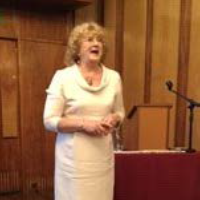By: Deepa Shastri, Projects Manager, Stagetext

For years I have spoken to people with various levels of deafness about how Stagetext works and how captions and subtitles can bring the world of theatres, galleries, and museums into people’s lives.
A lot of people I speak to may have closed the door on the arts a long time ago and it’s a huge pleasure to help them rediscover this world again.
One of our long-time users, Rosemary Hoffman, said: “I have been hard of hearing since I was a child and have used subtitles on TV for a long time. I hadn’t been to the theatre for about 20 years until I discovered Stagetext and captioning quite by chance when we went to the Open Air Theatre, Regent’s Park to see Much Ado About Nothing in 2008. Captioning was a revelation.”
The beauty of Stagetext and the way we work is that we try to prioritise open access wherever possible, which means we use captions and subtitles that are always on display for everyone to see. These may be on large caption screens in theatres, or more traditional looking subtitles at a museum talk. This does allow for that moment of discovery that so many of our users have and for every person we reach out to and introduce to our work, there is another who discovered our work by being in the right place at the right time.
It’s this discovery that has been lost during the last year.
But now, with venues being closed, people are wondering where they can find events and how the access will work. Though this is nothing new, even before the pandemic there were people all over the country who weren’t going to see shows, this may have been due to mobility issues, not knowing about captions and their availability, or simply because there was no accessible performances were available in their area.
Michell Hedley, a long time user of Stagetext captions, said: “I live in the regions; my local theatre receives touring productions, and these are often not accessible to me. It is a sad fact that at my local theatre I am restricted to seeing just a handful of shows each year. I shouldn’t be expected to travel halfway across the country just to see a show.”
The lack of access Michelle was experiencing suddenly became a national problem in March 2020, as now no one was able to visit their local theatres, galleries, or museums, it really levelled the playing field
After the initial shock of lockdown venues across the country turned to the internet to share their various performances, exhibitions and talks. Campaigns like “NT at Home” and “The Shows Must Go On” brought us theatre shows via YouTube, and even museums and galleries were broadcasting talks and tours on social media or via video conferencing. However, in the rush to adapt to this new way of working many venues forgot about access, and we at Stagetext spent those early days of the lockdown campaigning for organisations to supply captions and subtitles.
The majority of cultural organisations were remarkably responsive to these campaigns, and with our help we were able to begin making their content truly accessible. One of our proudest moments was when we subtitled the online stream of Phantom of the Opera, which had a massive audience of 12.8 million viewers around the world. A staggering 2.5 million viewers watched with accessible subtitles provided by Stagetext.
Hala Hashem, a member of Stagetext’s user panel, said: ‘In four weeks of “stay at home” I had watched six theatre productions, which has only been possible thanks to the subtitles. As an avid theatre goer who is profoundly deaf, this has been a very welcome change. I hope the use of online subtitles increases and continues beyond the pandemic’.
It’s one of the few silver linings we’ve found from venues being closed, not only have theatres been subtitling their work, museums, galleries, literary festivals etc have also been making their online content accessible too.
Anyone anywhere in the world can now enjoy almost any event from the comfort of their own armchair, and subtitles are available at the touch of a button.
We here at Stagetext will be some of the first people back into venues once it’s safe to be there, we love the thrill of live theatre, but in the meantime this world of online art and culture is beginning to feel quite revolutionary and is breaking down barriers.
Deepa Shastri, Projects Manager, Stagetext









